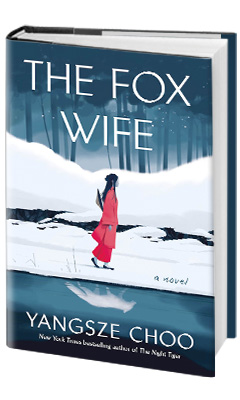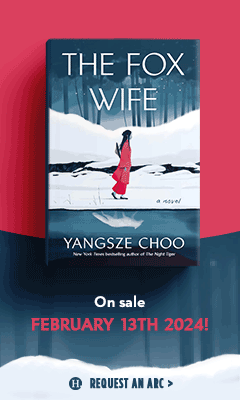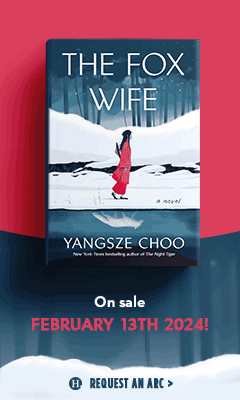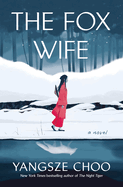The Fox Wife
by Yangsze Choo
Yangsze Choo's third novel, The Fox Wife, is just as steeped in Chinese folklore as her previous works (The Night Tiger; The Ghost Bride), this time with a focus on the tantalizing stories related to foxes, which were often worshiped at dedicated village shrines in China. Two tandem searches ramp up the level of suspense: in the winter of 1908 in Manchuria, in northeast China, a detective investigates a series of unexplained deaths; at the same time, a fox-woman masquerading as a servant plots vengeance against the man who murdered her child.
The book opens with this enticing line: "Perhaps you know this story: Late one evening, a beautiful woman comes knocking on an unsuspecting scholar's door." But it's soon clear that the narrator is no ordinary woman. Snow, a fox in the guise of a human, is as dangerous as she is alluring, and she is intent on having revenge on Bektu Nikan, a Manchurian photographer and hunter who killed her daughter.
Snow tracks Bektu Nikan's movement to the port city of Dalian. There she finds work as a maid, dubbed "Ah San" ("number three"), a generic name that indicates the contempt in which society holds the serving class. The family of her elderly mistress lives in the shadow of a curse: the oldest son always dies young. Bohai, Elder Mistress's grandson, is the second son and replacement heir. Now 23 and a student of Western medicine in Japan, Bohai is at home and so sickly that his family worry the curse will take him, too. Elder Mistress insists on accompanying him back to Japan to ensure his safety. Bektu is known to be in Japan, so when Snow goes along on the journey, she can continue her pursuit.
Choo raises the stakes with another search that's going on in parallel. When a courtesan's frozen corpse is found in an alley in Mukden, 63-year-old Bao Gong is called in to investigate. Bao suspects, from the description, that the man last seen with the dead woman was actually a fox. Bao has a special curiosity about fox tales, having grown up visiting a fox god's shrine with his nanny, and he collects cases that seem to involve fox mischief. Bao isn't your average detective. Not only is he significantly older than most in the profession, he also has two uncanny traits: an unfailing ability to tell when people are lying, and a mysteriously faint shadow. Both foxes and ghosts are considered "people with no shadows." Choo leaves what that might indicate about Bao as a lingering question.
Chapters about Bao's investigation, told in the third person, alternate with Snow's first-person narration, creating momentum. The book emulates the format of ancient Chinese literature by including commentary in the margins, and Choo peppers the text with intriguing facts about Chinese indigenous religion and its associated legends. "Foxes, people say, are wicked women," Snow informs readers. Could foxes be deities in disguise? In human form, they are as likely to be sinister tricksters as benevolent helpers. Snow says, "I exist as either a small canid with thick fur, pointed ears, and neat black feet, or a young woman. Neither are safe forms in a world run by men."
Snow is an unabashedly feminist narrator. While acknowledging the patriarchal norms of that time, Choo expands the sphere of women simply by granting attention to servants, foreigners, a medium, concubines, and the elderly--women looked down on by society. For instance, Tagtaa, a Mongolian concubine's daughter and Bao's childhood friend and crush, becomes a key character. Tagtaa is one of the rare women whose feet were not bound; Snow stands out for the same reason.
Along with Snow, Choo features two more foxes-in-disguise: Shirakawa or Shiro ("white"), who befriends--or perhaps bewitches--Bohai; and Snow's mate, Kurosaki or Kuro ("black"). Snow must feign unfamiliarity with both, although foxes recognize each other; most people perceive something unusual about them as well. Shiro is brazen in his troublemaking, whereas Snow tries to avoid notice. In an especially wonderful scene, Shiro visits the apothecary and tells increasingly gruesome fox tales over dinner. Snow is furious; "The first rule of foxes is that you don't talk about foxes." As Ah San, she eventually throws a tureen of red bean soup at Shiro to silence him.
Bao's suspicions start to focus on Snow, and their two story lines move ever closer together by way of one final murder investigation and a revelation about a character's past. As the plot's pace quickens, suspense mounts. The multilayered details of everyday life in early 20th-century China and the evocative metaphors ("Snow had fallen on her like a layer of rice flour") make for vivid, realistic scene-setting. Choo contrasts that air of realism with delicious hints of the supernatural. From the start, the author employs a playful, knowing tone that turns readers into co-conspirators. She issues a coy invitation to root for the foxes. The novel closes with a wink: "But if you're at least a little fond of foxes and don't consider us a plague or nuisance, leave out an offering of fried tofu. Who knows, we may come and visit you one fine summer evening." Fans of Lisa See and of Téa Obreht's The Tiger's Wife will fall in love with the historical magic and mystery. --Rebecca Foster








